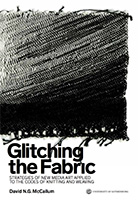The purpose of the research has been to explore the creative possibilities in applying strategies derived from the domain of digital media and glitch art to a range of processes in the domain of textiles—specifically weaving, knitting, bobbin lace—with particular attention to the role of notations and coding in both domains. The enquiry presented in this dissertation is based upon the proposition that there are creative possibilities that arise when approaches and strategies from new-media and glitch art are transferred to some textile processes, and that this is possible because objects of new media and textile objects share features not limited to the grid. The research focuses on strategies from digital media and glitch art in the domain of computing and applies these strategies directly to the code and structures in the domain of textiles. The textile objects share some features of new-media objects: formal representations (making them subject to algorithmic manipulation), a separation of content and interface, objects can be easily scaled, and they are open for hacking, which is a repurposing of the code. Strategies employed in this research include developing algorithms to generate structures and behaviour, deliberately inserting error into autonomous systems and exploring the aesthetic spaces generated by the error systems, exploring the manipulation of coded objects, understanding aesthetic spaces generated by algorithms as navigable spaces. In this research, these transfers have been tested and conducted through an applied process, creating artefacts of the artistic process, such as artworks, tools for creating artworks, and trial pieces to test techniques and strategies. These artefacts have been produced within the digital domain and the textile domain. The practical works realised in this way demonstrate the viability and the generative potentials for artistic and design practice that this transfer of strategies between domains yields. The work presented in this dissertation is thus an initial set of experiments laying the groundwork for future explorations employing this transfer of strategies, based on innovative cross-relations and exchange between the domain of computing and the domain of textile production.


